Hans Maagendans has been in the European banana business for almost 40 years. He is now ready to begin taking things a little easier. Retirement is, however, not on the horizon. Hans, an experienced banana trader, will remain involved with Banafood as an advisor. Though, as far as the day-to-day management goes, he is passing the baton - referred to as a mini-banana at Banafood - to his successor Han Ploegmakers.
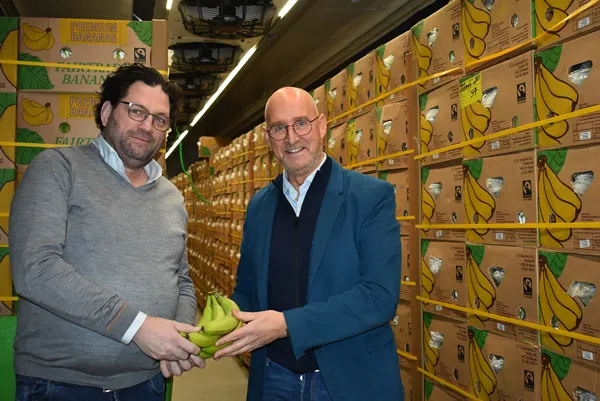
Han Ploegmakers and Hans Maagendans.
Pioneer with a tight stack system
Forty years ago, Hans' wife not only married him but also introduced him to his career in the banana business. From 1983 to 1995, Hans was the head driver at Bruigom & Visser, his father-in-law Jan Ritmeester's company. He has fond memories of that time. "Before then, bananas still all came in loose, loaded below deck," Maagendans begins.
"In 1983, Bruigom & Visser was one of the first to start using tight-stack ripening. Before that, bananas were still ripened on air (pyramid) or block pallets, five to a stack. When we introduced the tight, six-at-a-time stack system, no one thought it would work. But it turned out to be very efficient."
Managing bananas via computers began in the late 80s. "We initially used software developed by Priva, which had gained experience in ripening cheese and with systems in greenhouse farming. With more input from ripeners and installation companies' know-how, software systems have not only become indispensable; they keep developing," says Hans. He also still remembers the fall of the Berlin Wall. "At that time, Eastern Europe began buying plenty of bananas. They were suddenly as popular there as potatoes were in Western Europe."
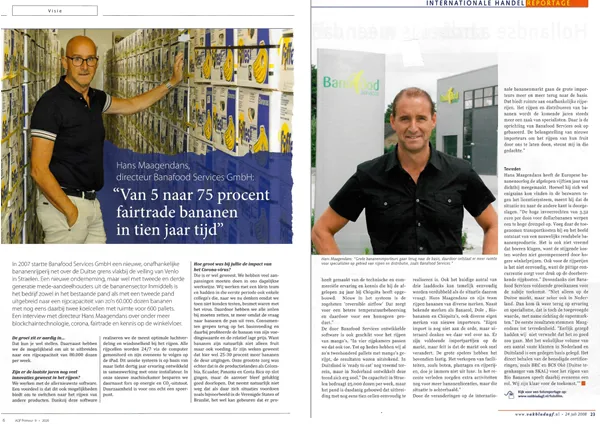
Previous interviews in trade journals.
Over the years, the ripening market has consolidated considerably. "When I started, there were still at least 25 banana ripening plants. Now, it's hard to find ten. That's a logical development because you can no longer survive with only five or ten ripening cells. It has become far more complex, with many more brands and SKUs. You used to have Chiquita, Del Monte and Turbana; these days, everyone has a logo on the banding or box," Hans continues.
Fairtrade bananas are now commonplace in stores. Yet, in the 90s, these were all but unknown. "I remember well when Leen Paardekoper of Ambtman Barendrecht imported the first Max Havelaar bananas. The entire banana sector was invited to the Hotel New York boat, where the first bunches of bananas were symbolically wheeled in. Back then, many people were skeptical about Fairtrade. Today, at least 75% of the bananas we ripen have the Fairtrade label."
Chiquita Fresh Gorinchem
In 1995, Chiquita bought Bruigom & Visser, changing the name to Chiquita Fresh Gorinchem. Shortly after that, several more Dutch ripening facilities were added under the name Chiquita Fresh. After 12 and a half years at Bruigom & Visser, Hans spent an equal amount of time as Chiquita Fresh's operational manager, celebrating that milestone in 2007.
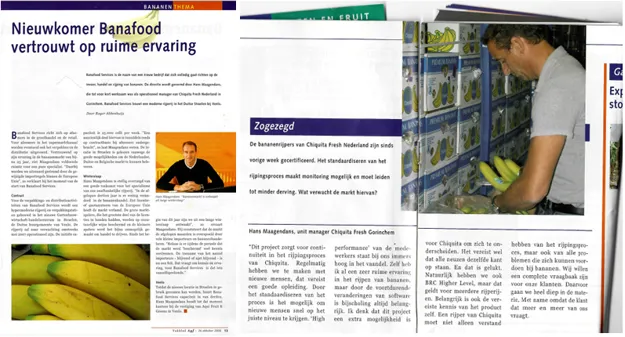
End of licensing era
He spent the last 15 years of his career in Germany, where he and fellow shareholders started a new ripening plant: Banafood Services GmbH. "The location is ideal. The land was relatively cheap, but, most importantly, strategically located between German, Dutch, and Belgian customers. In 2007 the licensing era had come to an end, and market opportunities arose. The financial crisis followed, so we were swimming against the tide. Initially, we were going to build ten ripening cells, but in the end, that was 20," Hans recalls.
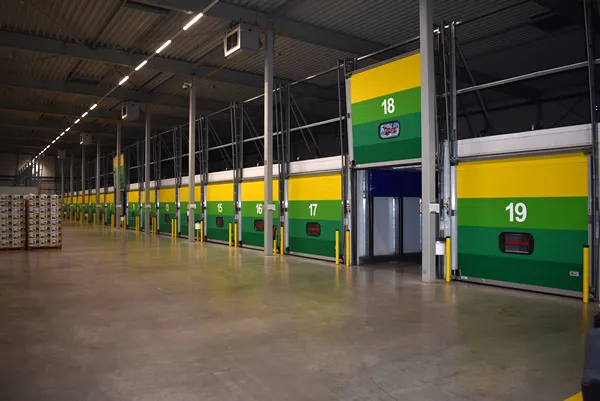
The ripening facility, built to handle a 20,000 box/week capacity, was later expanded to a 35,000 box capacity. After the latest expansion in 2018, it is now a modern ripening plant with a capacity of 60,000 boxes per week. Maagendans trained most of the staff, and his son Sander - the current head driver- has been with his father in Germany since the new ripening facility opened.
Hans cites tight planning and inventory management as the crux of a good ripening plant. "Too long a ripening schedule and the fruit dries out. Too short, and it cuts back the bananas' shelf life. A good operational ripener that should deliver the bananas as fresh as possible can make or break a company."
Combating waste
"Unfortunately, shop floor knowledge hasn't improved over the years. Some supermarkets offer as many as five different types of bananas; I personally wouldn't have more than three," Hans continues. Another piece of advice from him to supermarkets: do not stack bananas. "It's not a pre-packaged product. Also, stores shouldn't leave bananas out for too long. No one running a supermarket would ever say to leave bad bananas on the shelf, yet it still happens too often for fear of loss. Having beautiful bananas is what boosts sales."
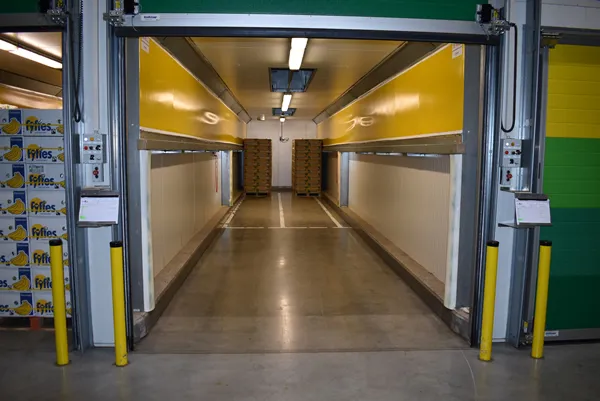
The banana market has challenges aplenty. "Great efforts are being made to develop a TR4-resistant variety, but as yet, there has been no true breakthrough. There are also major challenges regarding the climate, living wages, and the high cost of energy," explains Hans.
According to him, principal importers such as Chiquita, Del Monte, Dole, and Fyffes should collaborate more on sustainability. "There are fairly simple steps that can be taken. For example, currently, each banana importer has its pallet size or identity. Convert that to one standard pallet, which is logistically much easier than switching to EPS crates."
Know-how and experience
Although this banana man now fills a more advisory background role, he is not yet entirely out of the game. "I'm not someone to go cycling or golfing all day; bananas have always been my hobby and passion. I'm still brimming with ideas, and with this step and my new role, I can bring these to light differently," Hans says.
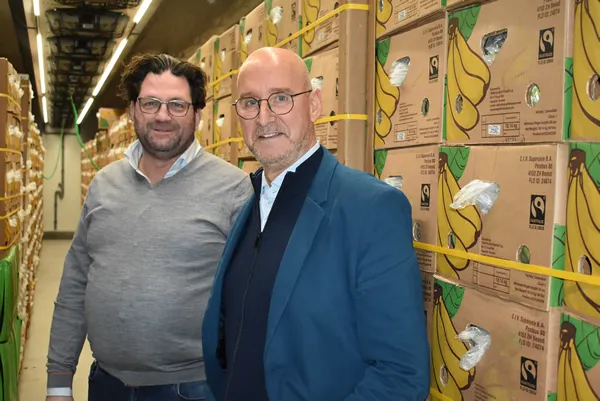
"I sold my share to my fellow shareholders in 2021. We've had a good familiarisation process over the past 18 months, in which Han gradually took over more commercial tasks. I've known Han for many years from the retail sector. I have every confidence that he's the right man to run Banafood as it should be."
"I'm also sure he'll do things like further shape the expansion in Germany. I'm enormously proud of what's been achieved in the past 15 years. We built a ripening company from the ground up to what it is today. That would, obviously, never have been possible without the good cooperation with exporters, importers, customers, and other business partners," Hans concludes.
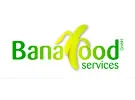 For more information:
For more information:
Banafood Services GmbH
7 Carl-Kuhne Street
47638, Straelen, DE
Hans Maagendans
Tel: +31 (0) 653 263 826
Email: hans@banafood.eu
Han Ploegmakers
Tel: +49 (0) 173 63 96 892
Email: han@banafood.eu
Website: www.banafood.eu
